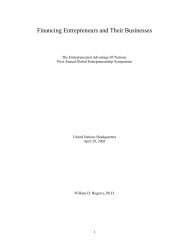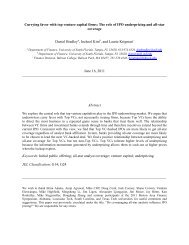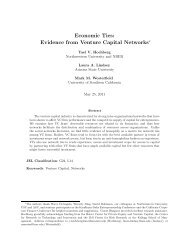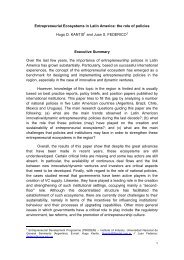Global entrepreneurship report - ResearchGate
Global entrepreneurship report - ResearchGate
Global entrepreneurship report - ResearchGate
You also want an ePaper? Increase the reach of your titles
YUMPU automatically turns print PDFs into web optimized ePapers that Google loves.
y which individuals assemble the resources and talent<br />
necessary to put a new business in place.<br />
Implications for Policymakers<br />
The GEM 2002 <strong>report</strong> was designed to present a timely<br />
description of the major variations and features of<br />
<strong>entrepreneurship</strong> around the globe. This, in turn, was intended to<br />
spark discussions with regard to the policy implications indicated<br />
by these findings. As a result, this <strong>report</strong> does not offer<br />
suggestions for specific national policies or guidelines. That task<br />
is better left to the GEM national teams who, because of their<br />
immersion in the local context, are better able to articulate the<br />
implications for their corner of the world. Nevertheless, a few<br />
broad observations and policy issues may be entered into the<br />
debate from this vantage point:<br />
■<br />
■<br />
■<br />
Perhaps the most significant general implication proffered<br />
by this research is related to the overall scope of the<br />
phenomenon itself. Even in the less entrepreneurial<br />
countries, tens of thousands, if not millions, of the citizenry<br />
are pursing <strong>entrepreneurship</strong> as a career option. Therefore,<br />
it would seem that it is incumbent on each government to<br />
make an effort to understand, if not encourage, this<br />
pervasive socio-economic phenomenon.<br />
GEM research continues to show a positive association<br />
between <strong>entrepreneurship</strong> and national economic growth. In<br />
developing countries, the link appears to be strongest with<br />
necessity <strong>entrepreneurship</strong>. However, few policymakers<br />
(even experts in <strong>entrepreneurship</strong>) seem to appreciate or<br />
understand this mechanism, though it has considerable<br />
potential. In certain parts of the world, it may be particularly<br />
vital to the economic well-being of the nation to ensure that<br />
all educational programs prepare all adults for an<br />
entrepreneurial career.<br />
The formal venture capital industry — an important source<br />
of funding for some firms in some emerging economic<br />
sectors — currently receives the bulk of attention from<br />
governments as a mechanism for providing new firm<br />
■<br />
financing. While venture capital is certainly an important<br />
component of the overall picture, the GEM 2002 research<br />
shows that the financial support provided by informal<br />
sources is 10 to 20 times more prevalent. It is, in fact, the<br />
fuel that is propelling the vast majority of new firms.<br />
Therefore, at the very least, governments should look for<br />
unobtrusive ways to identify and track the informal,<br />
personal financial flows that occur within their borders.<br />
They might also want to consider the development of<br />
policies that further encourage such flows.<br />
The GEM 2002 <strong>report</strong> presents preliminary evidence that the<br />
mechanisms leading to “high potential” R&D based startups<br />
may be quite different from those leading to the more<br />
“typical” variety. Government investment in understanding<br />
the differences between the two would seem like a sound<br />
bet. Infrastructure designed to support one may not be<br />
useful, or worse, might inhibit the development of the other.<br />
Both could eventually contribute to economic vitality, though<br />
through different processes.<br />
Finally, it is clear that <strong>entrepreneurship</strong> is a major<br />
mechanism leading to economic growth and adaptation in all<br />
economies whether developed, in transition, or developing. Only a<br />
very few countries have developed strategies that allow them to<br />
grow without high levels of entrepreneurial activity — Belgium,<br />
Hong Kong, The Netherlands and Singapore. It is also obvious<br />
that national differences in the level of activity — as represented<br />
by a relatively persistent rank order among countries — may<br />
reflect considerable institutional, social and cultural factors that<br />
may be quite difficult to change in the short run. The <strong>report</strong>s<br />
prepared by the GEM national teams highlight both the processes<br />
common among all countries and the unique features of each<br />
country, drawing on the assessments of national experts. The<br />
fact that many national governments have implemented a wide<br />
range of programs and procedures to facilitate or enhance<br />
entrepreneurial activity with little evidence of short-term impact<br />
is not evidence that the programs are necessarily wrong, only<br />
that major shifts in the phenomena may take time.<br />
33
















